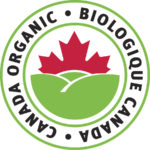Organic Definitions
Organic
The term organic refers to an ecological method of agricultural production that respects the natural environment. Organics focuses on enhancing the health and vitality of the soil, preserving biodiversity, promoting animal welfare and preserving the ecological integrity of our environment. No synthetic fertilizers, synthetic pesticides or genetically modified organisms are permitted in organics. Organic foodstuffs along with livestock feed are inter-provincially regulated in Canada under the Canadian Organic Regulation and must meet all requirements as set out in the Canadian Organic Standard.
Organic Certification
The term organic refers to an ecological method of agricultural production that respects the natural environment. Organics focuses on enhancing the health and vitality of the soil, preserving biodiversity, promoting animal welfare and preserving the ecological integrity of our environment. No synthetic fertilizers, synthetic pesticides or genetically modified organisms are permitted in organics. Organic foodstuffs along with livestock feed are inter-provincially regulated in Canada under the Canadian Organic Regulation and must meet all requirements as set out in the Canadian Organic Standard.
Canadian Organic Regulation
The regulation is legislation that has been passed by the government of Canada which states that in order for a food product to be deemed organic, it must meet the requirements as set out in the Canadian Organic Standard and the Permitted Substances List.
Canadian Organic Standard
This standard contains a set of criteria for all methods and practices for producing and handling crops, livestock and processed products.
Canada Organic Regime
This regime is a partnership between the federal government as represented by the CFIA (Canadian Food Inspection Agency) and the organic industry. This body oversees organics in Canada. The Regime helps protect consumers from misleading labeling, reduce confusion about the definition of organic and facilitate development of organic markets.
Permitted Substances List
This list identifies and supplies details on allowable substances that can be used in organic farming and production of organic products.
